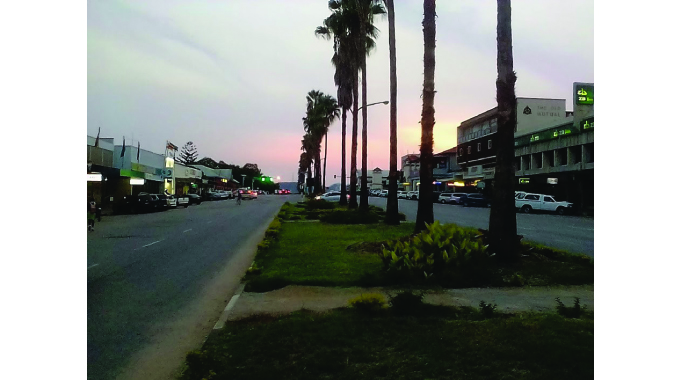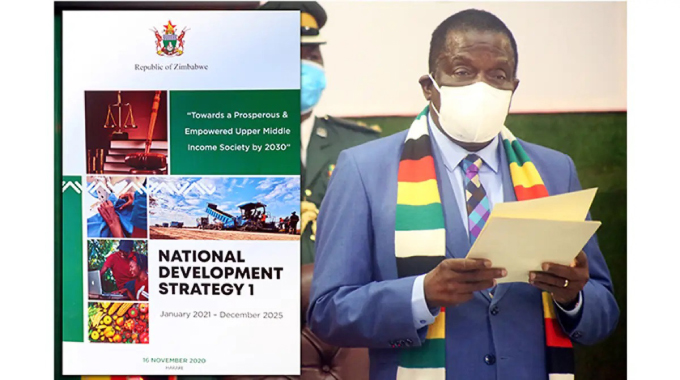
The Sunday News

Sharon Chimenya, Features Correspondent
NICELY spread like a carpet in one of Masvingo’s rivers, water hyacinth seems to be thriving due to increased water pollution as a result of poor waste management by the local authority and different industries west of the Central Business District (CBD).

Central Business District of Masvingo
By definition, water hyacinth is a type of invasive floating plant found in water bodies across the world.
These invasive species block the sunlight reaching and oxygen level in water systems, which results in damaging water quality and seriously affecting various life forms in the ecosystem.
The presence and the heavy growth of water hyacinth according to environmentalists is an indicator that the river is heavily polluted.
The growth of the weeds, they say, is promoted by the presence of phosphates and other effluents.
According to the Journal of Environmental Science and Public Health, the growth of water hyacinth in the water bodies in Zimbabwe is mainly due to the failure by the local authorities to control water pollution by raw sewage.
Water hyacinth affects fishing, transportation, irrigation and the tourism sector.
However, water hyacinth is not the only problem that is being experienced in the city due to water pollution, in the past few weeks fish have been dying due to the raw sewer that was spilling into the river.

MASVINGO City Council
Masvingo City Council and the Delta Corporation were fingered as responsible for the death of fish and were slapped with level 14 and 13 fines respectively by the Environmental Management Agency (EMA).
The local authority had been discharging raw sewage into Mucheke River due to the breakdown of one of its pumps at the Rujeko pump station, a problem which occasionally happens.
The poor waste management by the local authority is affecting the extraction of water from the river for various uses as it would be heavily polluted.
Masvingo City’s Town Clerk Engineer Edward Mukaratirwa said that the continual pollution of the water that flows into Mutirikwi Dam would result in the local authority spending more on chemicals to purify water for domestic use.
He blamed the leaking of the sewage to high levels of vandalism.
“As Masvingo City Council we are deeply concerned about the high levels of vandalism on our sewer infrastructures and in particular our major trunk sewer that collects sewer from the high-density areas and our industrial area.
Of late we have been experiencing frequent incidences of vandalism in our sewer where sometimes you would find very big boulders deposited in the manholes and as a result our sewer lines get choked and the spillages flow into major rivers in the city which are Shagashe and Mucheke River,” he said.
In a statement, EMA advised different industries to employ best environmental practices to reduce environmental pollution.
“EMA strongly advises and urges the industries which have effluent discharges to have pre-treatment facilities before discharging whatever waste into the environment.

Environmental Management Agency (EMA)
They also need to be licensed by the agency (EMA) which assists in monitoring and advising them on the best standard and prescribed practices which minimize and reduce environmental pollution,” read part of the EMA statement.
Meanwhile, the Mutirikwi Sub-catchment Council manager Mr Taruvinga Chivasa said they were engaging the Masvingo City Council on the issue of pollution as they could not offer permits to those who might want to extract water if it was polluted.
“We have noted that there was discharge of sewer and council was engaged and explained that it was an issue of a blockage in Rujeko.
We observed changes in the colour and the turbidity in water changed just after Masvingo Teacher’s College.
From our engagement with Masvingo City Council, they are in the process of finalising their sewage issue.
“Pollution affects the river system in the sense that you cannot permit the use of polluted water.
In Mucheke River from Maparanyanga area up to the confluence with Shagashe River there is no permit to use water there.
We have recently permitted some guys who are doing road works in Rujeko but pollution is affecting us so much.
We don’t want to manage polluted water as it is good for nothing,” he said.
He added that the water hyacinth which was a result of pollution affects the accessibility, the portability and the usability of the water in the rivers.
He said the water was no longer usable and they would continue engagements with the local authority to deal with the issue of pollution.
The country recently joined the rest of the world in commemorating the World Environment Day with emphasis on ensuring that proper waste management and sewer reticulation were prioritised by local authorities in the country.
A report by the Auditor-General on the value for money report on protection of wetlands by EMA indicated that urban surface water was the worst affected by raw sewage discharges from local authorities.
It was reported that at least 32 local authorities were discharging raw sewer into the environment.

National Development Strategy 1
And according to the National Development Strategy 1 (NDS1), water and sanitation situation remains weak with uneven outcomes with only 29,7 percent of households in the country having access to improved water sources and sanitation.
“The majority of the sewerage systems have experienced large-scale blockages, water treatment plants are dysfunctional and lack chemicals while many distribution systems have fallen into disrepair.
Additionally, unreliable energy supply has affected efficient operation of the water supply and sewerage systems in urban areas.
Erratic water supply has led to decreased industrial production and breakouts of water-borne health crises,” reads the NDS1.
It gives the relevant Government departments the objective to expand access to improved sanitation facilities from 70,22 percent to 77,32 percent in both urban and rural areas, with particular attention to reducing open defecation in rural areas up to 2025.
Additionally, priority will be in addressing weaknesses in capacities in the delivery of adequate sanitation services which include mobilisation of financial resources, human capital, technical skills, and equipment.



